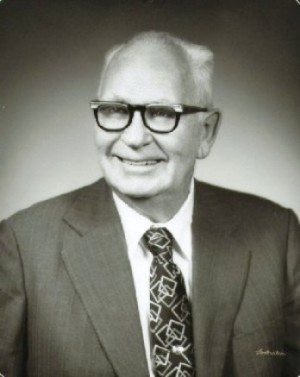| |
 Digital Scrapbook Digital Scrapbook
Dewey O. Wiley, known to many as "Prof" or "D. O.” still has a familiar ring throughout the band halls of Texas although retired from the band profession since 1959. Wiley, known as “the father of the school band movement in Texas”, served as band director at Hardin-Simmons University in Abilene from 1922 to 1934, and at Texas Tech University from 1934 to 1959.
He was born in Alexander, Texas, in 1898, grew up in Graham, where his father worked a small farm and raised nine children. Dewey, as a child, loved to listen to the old country fiddlers. His early self-taught musical training started when he secretly experimented with his brother’s violin after the brother had gone to work in the fields. By the time Dewey was five years old he was playing the violin. While in elementary school, Dewey taught himself from a mail order violin method, and miraculously learned fundamentals correctly. During his high school years, he traveled to Fort Worth to study violin. Wiley attended Midland College where he conducted the school orchestra, taught violin, played tackle on the football team, and married his high school sweetheart, Willie Ruth Cole.
In 1921 he went to Simmons College (now Hardin-Simmons) where he directed the orchestra and taught violin. In 1922 the band director failed to return for the fall semester and the president of the college asked Wiley to take the post. The Abilene Chamber of Commerce asked if he would take the Simmons band to a con¬test in San Angelo in the spring, he objected that the band had no uniforms, but the chamber countered that they would outfit the band and asked him to select a design. As Wiley left the chamber, he noticed a pair of cowboy chaps in the window of a nearby store, and went in to look. He dressed a student in cowboy boots, chaps, a loud western shirt, and a ten-gallon cowboy hat, and marched him into the chamber office. The design was accepted on the spot. Thus was born the famous Cowboy Band. They lost the contest in 1923, but won in 1938 to become the official band for the West Texas Chamber of Commerce. In the twelve years Wiley served as director, they toured all over the United States and Europe
The three month 1930 European tour is still talked about at Hardin-Simmons. The Cowboy Band was under a professional contract with an agent who booked them in all the big countries in Europe. All expenses for the band and salaries of the directors were paid by the management.
Wiley accepted the post as band director at Texas Tech University in 1934 and in a short period of time built the band into one of the largest and best in the nation. World War II took its toll and dwindled the band’s enrollment to about 60 by 1943. After the war Wiley rebuilt the band to about 180 when he retired in 1959.
It was during a Texas Tech summer band camp that Colonel Earl D. Irons founded the Alpha Chapter of Phi Beta Mu with the help and encouragement of Dr. Wiley and other band directors attending the camp.
Dewey Wiley earned his unofficial title “Father of Texas Bands” partially because of the large number of his students who became Texas band directors, but primarily through his pioneer work with the Texas Music Educators Association and its predecessors. After serving several terms as officer in these organizations, he was elected treasurer for two terms and president for two terms; he served as editor of the TMEA magazine. Upon his retirement from Tech in 1959, he became the first full-time Executive Secretary of TMEA. The forty years Dr. Wiley played an active roll in the TBTA—TMEA were marked by a phenomenal transition of music edu¬cation in Texas, from a period of a few town bands and orchestras of an extracur¬ricular nature, to a period in which the music educators or Texas achieved a level of national leadership in the performance level of its bands.  |